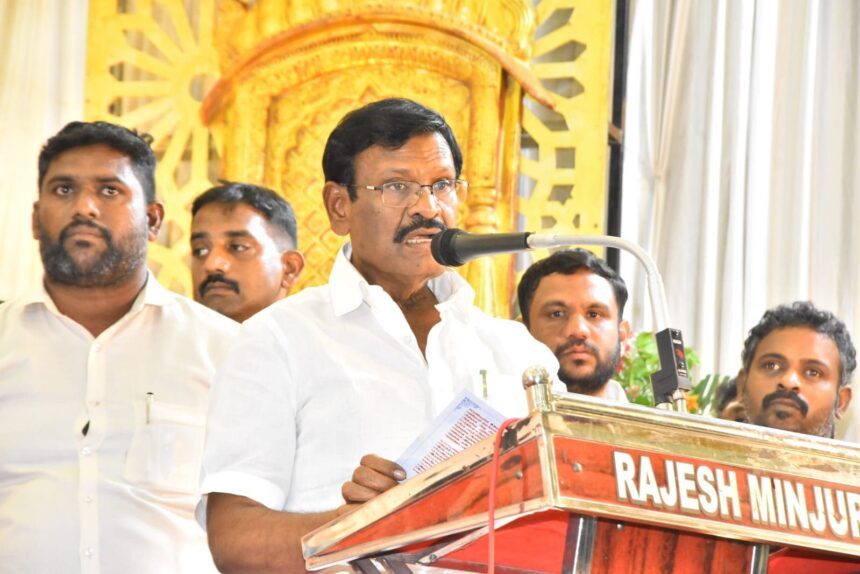Tamil Nadu’s Minorities Welfare and Non-Resident Tamils Welfare Minister S. M. Nasar stated on Saturday that the reconstitution of the Tamil Nadu Waqf Board under the amended Waqf Act will not take place until the Supreme Court delivers its final verdict.
Nasar explained that the Union government had enacted the Waqf (Amendment) Act, 1995, which is now referred to as the Unified Waqf Management, Empowerment, Efficiency and Development Act, 1995, effective from April 8, 2025. He noted that the ruling Dravida Munnetra Kazhagam (DMK) party has consistently opposed this legislation and has challenged it in the Supreme Court.
“Various stakeholders have filed petitions against the new law. In light of these challenges, the Supreme Court issued an interim order on September 15, staying certain provisions of the amended Act,” Nasar added. He criticized the Union government’s swift passage of the Act, asserting that it lacked adequate deliberation.
Furthermore, the minister emphasized the government’s commitment to protecting the rights and interests of the Muslim community, which has expressed concerns regarding the amendments.
M. H. Jawahirulla, president of the Manithaneya Makkal Katchi (MMK), urged the state government to ensure the continuity of the Waqf Board’s functions. He called for the immediate appointment of a special officer and swift action to fill the assistant secretary position, which has been vacant for nearly two years.
Earlier, Tamil Nadu Chief Minister M. K. Stalin announced that the DMK would contest the amended Waqf Act in the Supreme Court, asserting, “This amendment should not only be opposed but fully withdrawn.” He further alleged that the actions of the BJP-led coalition government carry ulterior motives that betray certain societal groups.
The All India Muslim Personal Law Board (AIMPLB) has praised the DMK-led Tamil Nadu government’s decision to refrain from forming a new State Waqf Board under the revised law, labeling the move as “timely, appropriate, and courageous.” In a press statement, Dr. SQR Ilyas, spokesperson for AIMPLB, commended the state government for its principled stand until the Supreme Court reaches a final judgment.
In March, the Tamil Nadu Assembly unanimously adopted a resolution proposed by Chief Minister Stalin, requesting the Union government to withdraw the Waqf (Amendment) Bill. The AIMPLB called on other state governments to take similar actions to uphold the secular and democratic values of the Indian Constitution.
In parallel, the Kerala Legislative Assembly passed a resolution in October 2024 urging the central government to retract the 2024 Waqf Bill.
The Waqf (Amendment) Act, 2025, ratified by the Indian Parliament in April 2025 with presidential assent granted on April 5, introduces significant reforms to the Waqf Act of 1995 and has attracted intense criticism for being perceived as discriminatory and unconstitutional, undermining the religious autonomy and property rights of Muslims. The amendments have prompted widespread protests from Muslim organizations, opposition from various state governments, and numerous legal challenges in the Supreme Court.
Critics contend that the legislation increases governmental oversight over the administration of waqf properties, thereby diluting community control. Calls for repeal have emerged from multiple quarters to protect secular principles and safeguard minority rights.
Several opposition parties, including the Indian National Congress, AIMIM, Indian Union Muslim League, Trinamool Congress, DMK, Aam Aadmi Party, Samajwadi Party, RJD, and Left parties, have raised serious concerns, with many urging the outright withdrawal of the Bill.
Recently, a Supreme Court bench led by Chief Justice B.R. Gavai and Justice A.G. Masih considered multiple petitions contesting the constitutionality of the Waqf (Amendment) Act, 2025. While they declined to stay the entire law, they partially stayed certain provisions to prevent arbitrariness and protect minority rights.
Specifically, the Supreme Court suspended Section 3(1)(r), which required individuals to practice Islam for five continuous years to establish a Waqf, pending the formulation of eligibility rules by respective State Governments. The court also stayed a provision granting a government-designated officer the authority to resolve encroachment disputes involving Waqf properties, asserting that such powers cannot be conferred on an executive authority as it infringes upon the separation of powers doctrine. Instead, these disputes are to be handled by the Waqf Tribunal, while the creation of any third-party rights is prohibited until the dispute resolution process concludes.
Tags: Tamil Nadu, Waqf Board, SC verdict, state government, minister
Hashtags: #Tamil #Nadu #wont #reconstitute #state #Waqf #Board #verdictsays #minister










